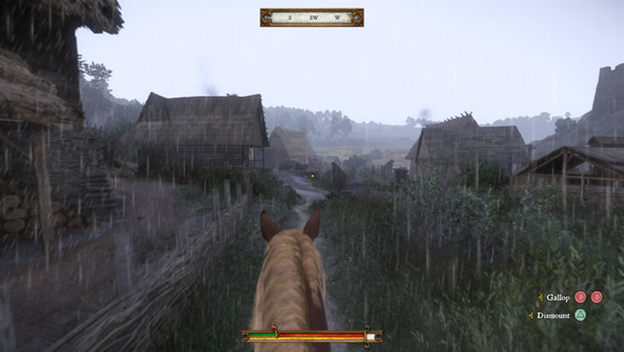This article previously appeared on Crossfader
It’s not uncommon to hear the phrase “I was born in the wrong decade.” Nostalgia can overtake common sense, and people yearn for rose-colored scenes of the past, ignoring the hard truths that come with that fantasy. The current cultural obsession with the ‘80s conveniently glosses over rockier points of the decade like the AIDS crisis and the looming threat of Mutually Assured Destruction. While STRANGER THINGS fans are a dime a dozen, you’d be hard-pressed to find anyone willing to trade out the period-appropriate internet services required to watch that show in exchange for a chance to go back to that era. Harder yet would be finding someone who wishes they were living in 15th century Europe. Chugging beer all day, every day sounds fun until you remember that the water was polluted and the accompanying buzz from your day drinking was the only thing to take the edge off of an unending cycle of plague, famine, and warfare.

>TFW your lord forgets to pay monthly tribute to the neighboring fiefdom
Still, if you’re looking for a shorter stay, the Middle Ages provide a fascinating period to explore, and there has never been a better opportunity to discover what the Old World was like than KINGDOM COME: DELIVERANCE. Developed by Warhorse Studios and published by Deep Silver, KINGDOM COME drops you into the role of Henry, son of a blacksmith in an idyllic small town of Skalitz in Bohemia, now the Czech Republic. The former King, Wenceslaus IV, was deposed by his brother, Sigismund of Hungary, who now looks to tighten his grip on the kingdom. Part of Sigismund’s campaign is to raid Skalitz, whose lord is loyal to Wenceslaus, leading to the death of Henry’s entire family. Seeking vengeance, Henry joins a resistance movement against Sigismund.
KINGDOM COME’s ace in the hole is the focus on realism that permeates all areas of design; not just in the gameplay, but in the worldbuilding as well. The attention to historical accuracy in every bit of minutiae lends a sense of truth that pushes the story forward. The exposition at the start gives you enough context to complete the game, but there’s also tons of supplemental reading about the time period and the people you can read at any point if you’re interested. The characters of the town, their trades, and even their diction add to the atmosphere of the game and the simulation of medieval life.

Now going medieval has a whole new meaning
Henry is a peasant through and through, starting the game woefully lacking any skills. It’s up to you to fine tune him to suit your style of play. There aren’t any character classes, so everything from alchemy to zweihander-swinging is at your disposal. It pays to maintain proficiency in both civilian and martial skills, as unlike many fantasy RPGs, the biggest challenge in KINGDOM COME is keeping Henry rested, fed, and healthy. You’ll have to exist in this difficult era as people actually living during the Middle Ages would have, without magic spells, basic medicine, or even literacy. If you want Henry to be able to read, you’re going to have to find someone willing to teach him. Jumping off the second floor balcony won’t just remove health points, it will break your legs. The game’s pervading authenticity requires caution at all times, because a single misstep could end up with major ramifications.
The emphasis on realism makes combat especially risky, but also allows for a range of approaches. Along with your fists, you can use nine different classes of weapons, ranging from the classical sword or bow to the mace, polearm, or axe. Each weapon has unique qualities and drawbacks, more often tied to their ergonomics and handling than arbitrary stats. For instance, the longsword is powerful but slow, and more importantly can’t be used while riding on horseback.

Make sure to not ride your horse to death, it wouldn’t be very neigh-borly of you
The fighting itself borrows several ideas from last year’s FOR HONOR. You have to choose which part of the body you want to attack and what sort of strike will be the most effective against the type of armor equipped, all while parrying your opponent’s blows. Blocking is vital, as Henry will drop after only a few hits, and even surviving an attack will still result in a range of debilitations. Henry’s extreme mortality forces you to seriously consider what will happen before ever entering combat, if the gamble is worthy enough or if you should try to talk your way out of the situation.
Even with the dangers that come with it, combat is really fun once you get the controls down. There’s no room for button mashing, as going up against someone has a rhythm and you have to plan out your attacks while watching your enemy. You develop an acute sense of vulnerability as you try to keep Henry unscathed, because if you get hurt, you can’t duck somewhere and recover, you have to deal with it like the injury it is. At best, people will avoid you because of your gory visage; at worst, you’ll bleed out and get a game over.
And you really don’t want to get a game over, because you are not able to save whenever you fancy. You either have to go to a bed, a bathhouse, start a quest, or buy some expensive alcohol called “Savior Schnapps” that lets you save. Such a harsh penalty for death was a fair gamble to take, except that even weeks after launch, KINGDOM COME is still laiden with bugs, which in my case led to me needing to restart the game twice, losing a fair bit of progress each time. There have already been significant patches released to alleviate many of these smaller glitches, but long loading screens and frequent issues with clipping can make waiting for those updates seem futile.

It’s so peaceful, you’d almost forget there were no toilets and everyone smelled awful
Between the learning curve and the mechanical hiccups, KINGDOM COME can feel intimidating, but such thoughts are quickly forgotten when the training wheels come off and the player is finally allowed to explore Bohemia. It’s easy to dismiss the problems in KINGDOM COME when you are given such free roam of the world in a way most modern role playing games have not provided. For instance, one quest tasks with you repoing a hammer from a villager who won’t pay. To get the hammer, you can talk him into giving it to you, fight him, have your friends beat him up, or break into his house and steal it. But any action you take, especially illegal ones, have repercussions. NPCs become suspicious after a theft occurs, and it’s wise to sell the stolen goods in a different town or else you might get discovered. All these considerations add to the complex realism and humanity of the game world. It’s an engaging experience to have to creatively solve problems that were common at one time, while remembering the possible outcomes.
KINGDOM COME: DELIVERANCE may seem daunting at first, if only because the game’s massive scale, but getting lost in its world is easier than you can imagine. Even if the research and effort put into the recreation isn’t your cup of tea, the mechanics and gameplay present more of a hardcore simulation more than a traditional RPG, which is something of a rarity in the mainstream gaming market. While the subject matter is dense and the occasional bug can sometimes break the immersion, being able to explore a meticulously detailed vision of a bygone era at one’s leisure is one of the most enjoyable gaming experiences I’ve had in a while.
Verdict: Recommend
Reviewed on Xbox One
















Comments